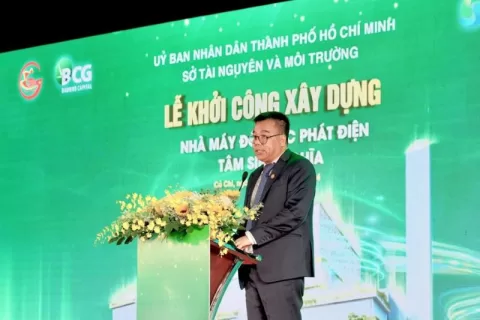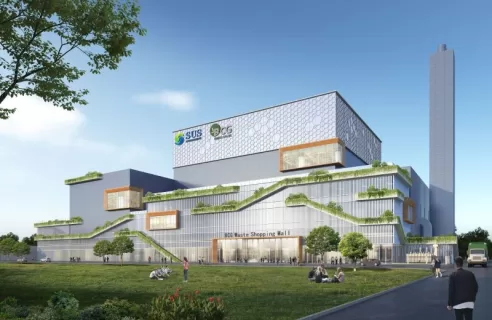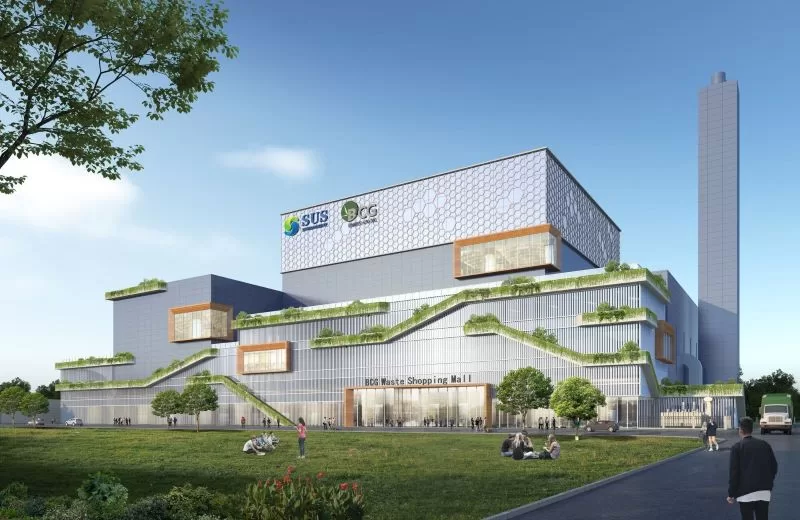Vietnam, like the rest of the world, faces impending doom if it does not address its solid waste problem any time soon. Fortunately, the country is not only focused on projects that create attractions for both tourists and locals but is also currently taking steps to ensure it doesn’t happen, at least not in the very near future.
Ho Chi Minh City’s Department of Natural Resources and Environment currently targets treating 80% of its domestic waste by 2025 and, eventually, 100% by 2030, using cutting-edge incineration technology.
One to take the initiative is the Bamboo Capital Group through its Tam Sinh Nghia Waste-to-Energy Plant project, which conforms with the goals that the government had set out in its 11th Ho Chi Minh City Party Congress for the 2020 – 2025 term resolution.
Groundbreaking Ceremony

BCG’s Vice Chairman, Mr. Pham Minh Tuan (photo credits: https://vneconomy.vn/bamboo-capital-breaks-ground-on-waste-to-energy-plant-in-hcmc.htm
On July 20 this year, the Bamboo Capital Group held a groundbreaking ceremony for its first-ever waste-to-energy plant project. This move was made after it acquired Tam Sinh Nghia Investment Development JSC on January 31, also this year.
The Tam Sinh Nghia Waste-to-Energy Plant project is divided into two parts: Phase 1 and Phase 2, valued at US$252.6 million (VND6.4 trillion) and US$276.3 million (VND7 trillion), respectively.
The first phase is expected to incinerate between 2,000 and 2,600 metric tons of waste per day and generate about 60MW power of power, enough to supply 100,000 households’ electricity demand. At this rate, the annual output can be anticipated to contribute 365 million kWh to the grid per year.
The second phase, on the other hand, is expected to burn up to 6,000 metric tons of waste per day and generate up to 130MW of power daily that can provide electricity for up to 200,000 households.
A third phase is still being conceptualized, but its target is to produce around 200MW out of 8,000 to 8,600 megatons of waste daily that can supply around 338,000 households.
What We Know About the Tam Sinh Nghia Investment Development

Architectural Rendering of Project (Photo credits: https://www.prnewswire.com/apac/news-releases/sus-environment-formally-signed-epc-contract-for-the-tam-sinh-nghia-waste-to-energy-project-in-ho-chi-minh-city-vietnam-302274471.html)
Tam Sinh Nghia Investment Development Joint Stock Company commenced operation on May 22, 2006. Its headquarters is in No. 2 Lien Khu 1-6 St., Quarter 6, Binh Tri Dong Ward, Binh Tan District, Ho Chi Minh City. It mainly focuses on waste management services and remediation activities around Ho Chi Minh City, as well as in Kien Giang and Long An provinces.
Tam Sinh Nghia secured licenses for its waste-to-energy technology application in the said locations. The incineration plant is slated to use state-of-the-art technology to treat around 20% to 25% of the city’s daily trash and generate power for different purposes such as production, domestic, and other business activities.
How Bad is Vietnam’s Solid Waste Crisis?
Picture this: the country’s most populous city discharged an average of 9,800 megatons of domestic trash daily in 2023 and peaked at 11,000 megatons during holidays. As a nation, Vietnam discharges about 60,000 megatons of garbage each day, which is why it is no surprise being considered one of the largest waste-producing countries in the world.
Not only that, but experts saw an average growth of 6% per year from 2021 and expected the trend to last up to 2030 if nothing is done to mitigate the problem. Because of this, the need for landfills, which cause more severe pollution problems, continues to rise.
The incineration plant burns the trash to generate heat, which turns into electrical energy through the use of advanced technology. Additionally, the by-products that are generated can be processed and turned into some useful materials. Particularly, the subsequent ash can be processed to create building materials, and the wastewater can be treated and re-used for machine cooling.
Tam Sinh Nghia Waste-to-Energy Plant Factsheet
Owner: Tam Sinh Nghia Investment and Development JSC (Parent: Bamboo Capital Group)
Plant Name: Cu Chi Waste-to-Energy Power Station
Project Type: Waste-To-Energy-Plant
Location: District of Cu Chi, Ho Chi Minh City, Vietnam
Contractor (EPC): (1) SUS Environment and (2) Power China International
Value: US $251.5 Million (VND 6.4 trillion)
Construction Start: July 20, 2024
Construction End: December 2025

Leave a Reply